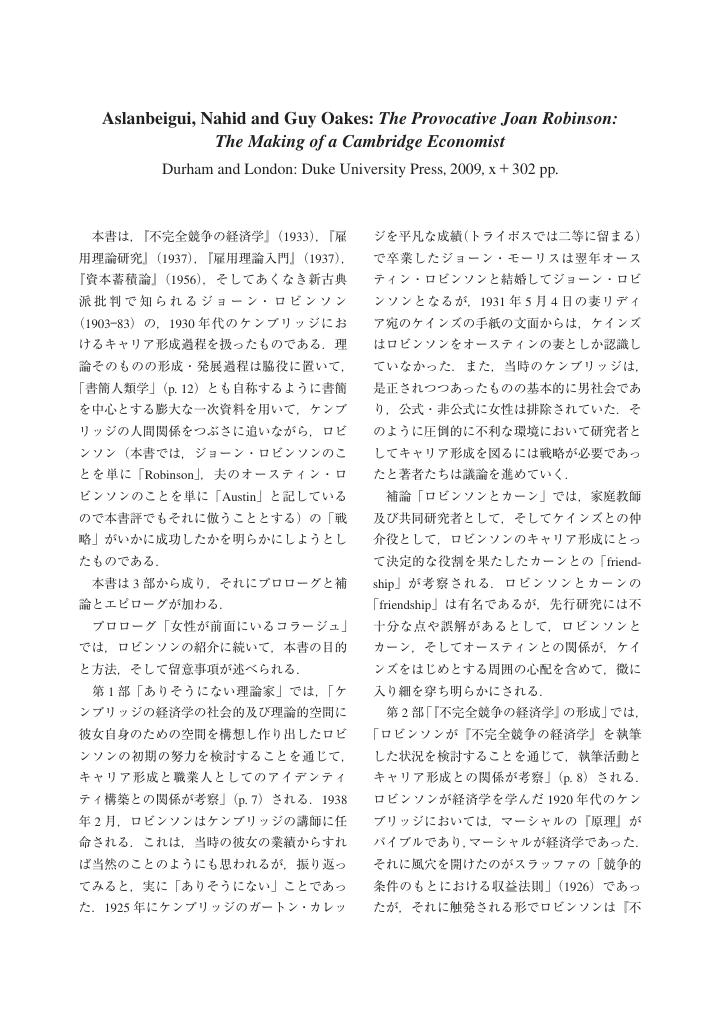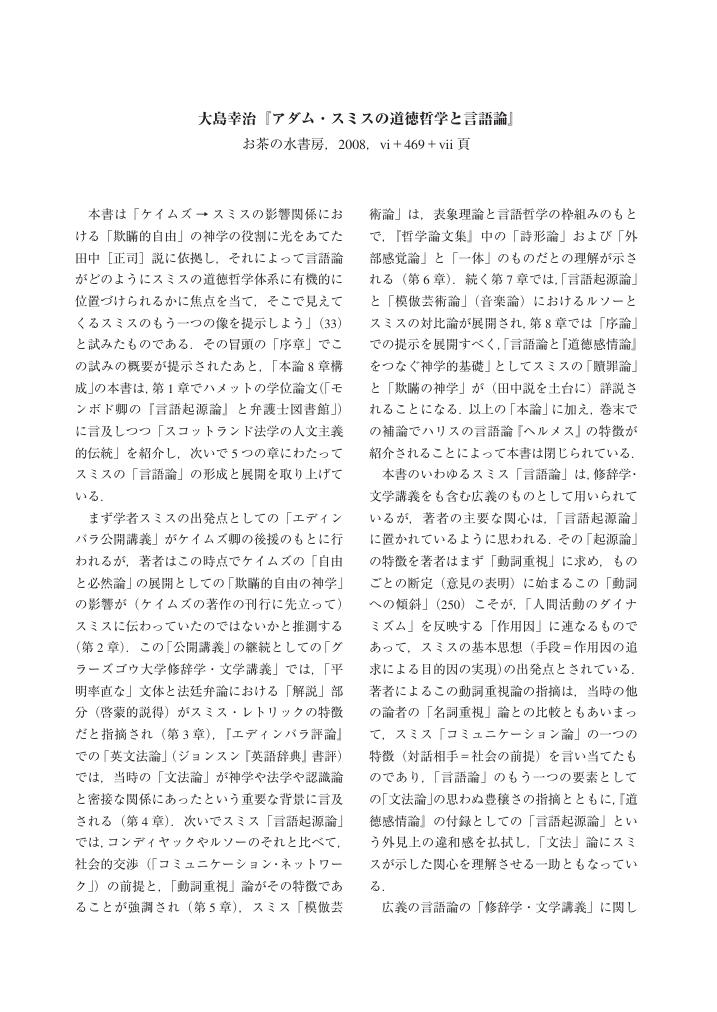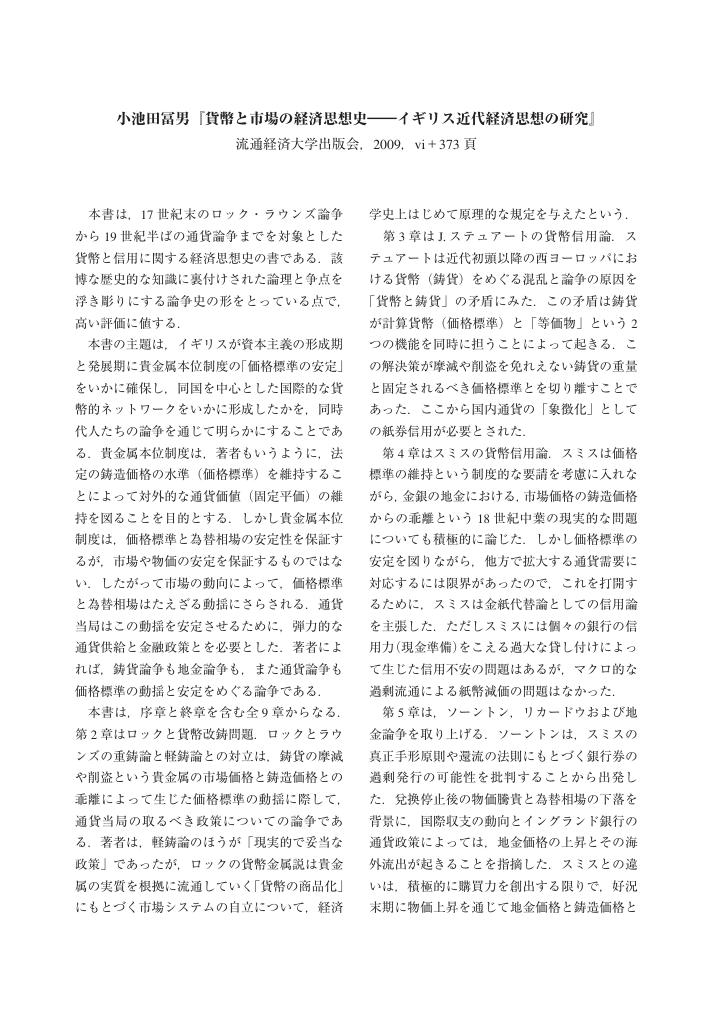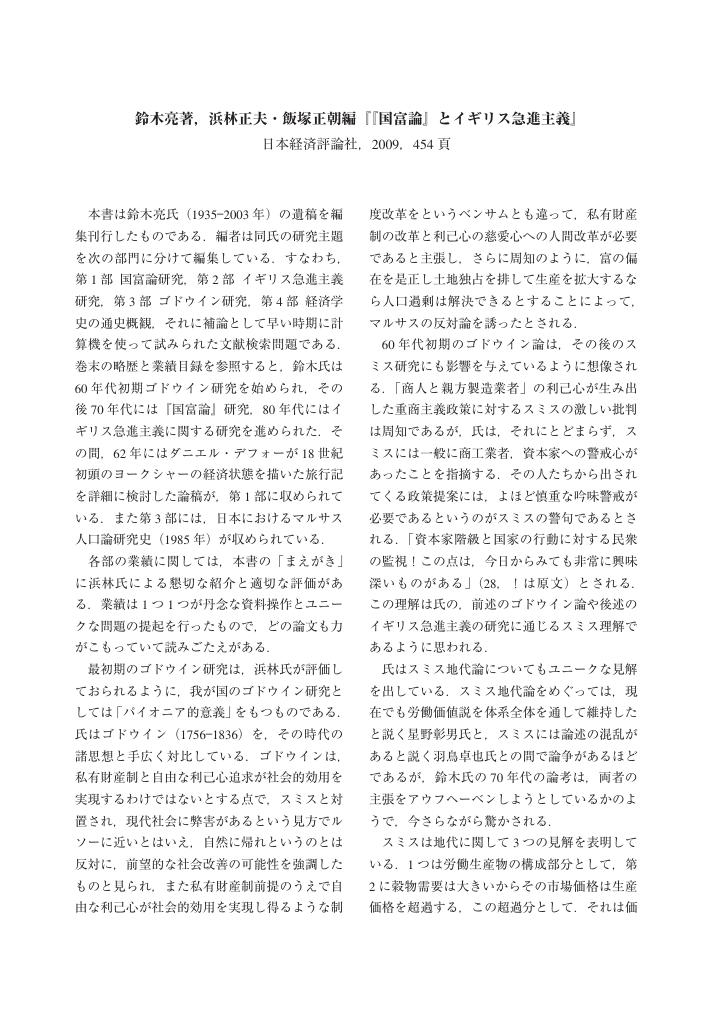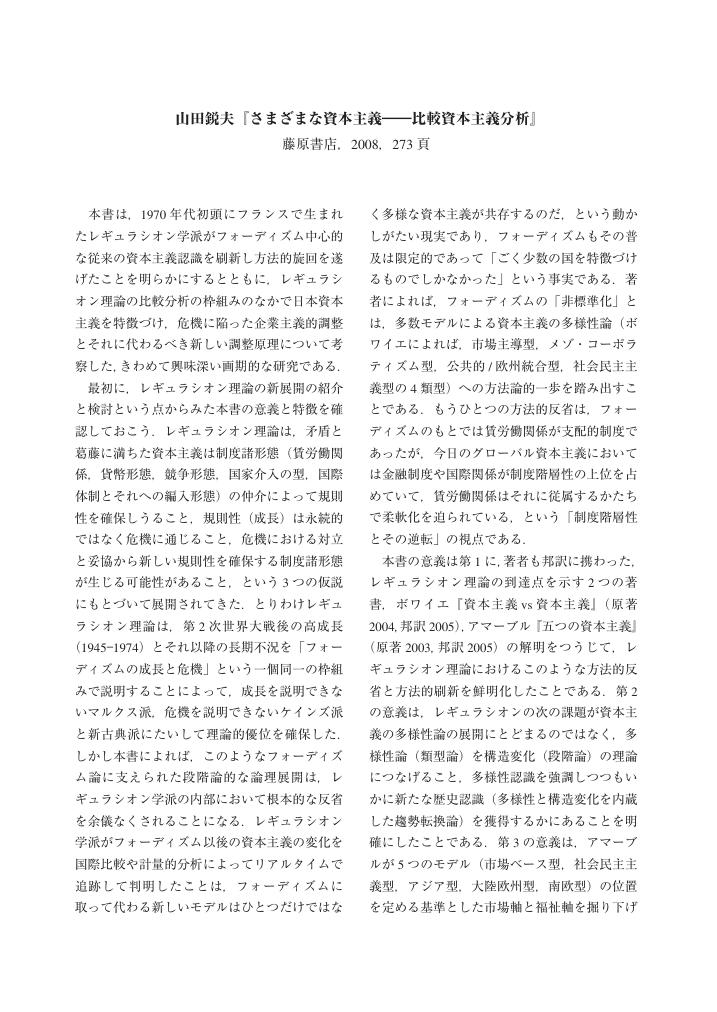1 0 0 0 OA J. S. ミルの理想的市民社会論と株式会社論
- 著者
- 前原 直子
- 出版者
- 経済学史学会
- 雑誌
- 経済学史研究 (ISSN:18803164)
- 巻号頁・発行日
- vol.52, no.2, pp.100-126, 2011 (Released:2019-08-20)
This paper aims to analyze John Stuart Mill’s theory of joint-stock companies on the basis of Mill’s theory of an ideal civil society. Mill recognized that the Industrial Revolution sparked social and economic problems. Unskilled labourers lapsed into moral decadence, which lowered productivity and decreased profit rates; thus this would then result in a dismal stationary state without any reform in the distribution of wealth. However, Mill asserted that social reforms would realize the ideal condition of a civil society even in the stationary state. To resolve these problems, Mill’s theory of joint-stock companies is significant from two perspectives. First, from the perspective of productivity, large-scale production is greatly promoted by the accumulation of large capital through the formation of joint-stock companies. Furthermore, co-operation among various people and combination of the labour force would lead to superior productivity. Second, from the perspective of property, Mill insisted on fair and just distribution of wealth and the necessity of managerial reforms. Reforms aimed at solving the unequal distribution of wealth could raise the living standards and the moral and intellectual standards of labourers. The moral qualities of this new kind of labourers, which could increase the rate of productivity, are as important to the overall efficiency of their labour, as their intellectual qualities. On the basis of the law of the inverse relationship between cost of labour and profits, Mill asserted that superior productivity would reduce the total cost of labour and increase the real wages of labourers and profits of capital. It was for this reason that Mill emphasized the importance of human development in terms of both labour and capital and the significance of joint-stock companies wherein labourers acquire skills and develop their abilities and individual specialties. JEL classification numbers: B 31.
- 著者
- 山本 英司
- 出版者
- 経済学史学会
- 雑誌
- 経済学史研究 (ISSN:18803164)
- 巻号頁・発行日
- vol.52, no.2, pp.141-142, 2011 (Released:2019-10-28)
- 著者
- 舩木 惠子
- 出版者
- 経済学史学会
- 雑誌
- 経済学史研究 (ISSN:18803164)
- 巻号頁・発行日
- vol.52, no.2, pp.143-144, 2011 (Released:2019-10-28)
- 著者
- 益永 淳
- 出版者
- 経済学史学会
- 雑誌
- 経済学史研究 (ISSN:18803164)
- 巻号頁・発行日
- vol.52, no.2, pp.145-146, 2011 (Released:2019-10-28)
- 著者
- 村松 茂美
- 出版者
- 経済学史学会
- 雑誌
- 経済学史研究 (ISSN:18803164)
- 巻号頁・発行日
- vol.52, no.1, pp.110-111, 2010 (Released:2019-10-25)
1 0 0 0 OA 長幸男『石橋湛山の経済思想』東洋経済新報社, 2009年, xvii+334頁
- 著者
- 井上 琢智
- 出版者
- 経済学史学会
- 雑誌
- 経済学史研究 (ISSN:18803164)
- 巻号頁・発行日
- vol.52, no.1, pp.114-115, 2010 (Released:2019-10-25)
- 著者
- 太子堂 正称
- 出版者
- 経済学史学会
- 雑誌
- 経済学史研究 (ISSN:18803164)
- 巻号頁・発行日
- vol.52, no.1, pp.116-117, 2010 (Released:2019-10-25)
- 著者
- 平井 俊顕
- 出版者
- 経済学史学会
- 雑誌
- 経済学史研究 (ISSN:18803164)
- 巻号頁・発行日
- vol.52, no.1, pp.118-119, 2010 (Released:2019-10-25)
1 0 0 0 OA 中村廣治『リカードウ評伝――生涯・学説・活動』(昭和堂,2009年)をめぐって
- 著者
- 千賀 重義 佐藤 有史
- 出版者
- 経済学史学会
- 雑誌
- 経済学史研究 (ISSN:18803164)
- 巻号頁・発行日
- vol.52, no.1, pp.88-94, 2010 (Released:2019-08-20)
- 著者
- 野口 旭
- 出版者
- 経済学史学会
- 雑誌
- 経済学史研究 (ISSN:18803164)
- 巻号頁・発行日
- vol.52, no.1, pp.98-99, 2010 (Released:2019-10-25)
- 著者
- 伊藤 宣広
- 出版者
- 経済学史学会
- 雑誌
- 経済学史研究 (ISSN:18803164)
- 巻号頁・発行日
- vol.52, no.1, pp.100-101, 2010 (Released:2019-10-25)
- 著者
- 篠原 久
- 出版者
- 経済学史学会
- 雑誌
- 経済学史研究 (ISSN:18803164)
- 巻号頁・発行日
- vol.52, no.1, pp.102-103, 2010 (Released:2019-10-25)
- 著者
- 大友 敏明
- 出版者
- 経済学史学会
- 雑誌
- 経済学史研究 (ISSN:18803164)
- 巻号頁・発行日
- vol.52, no.1, pp.104-105, 2010 (Released:2019-10-25)
- 著者
- 南森 茂太
- 出版者
- 経済学史学会
- 雑誌
- 経済学史研究 (ISSN:18803164)
- 巻号頁・発行日
- vol.52, no.1, pp.106-107, 2010 (Released:2019-10-25)
- 著者
- 和田 重司
- 出版者
- 経済学史学会
- 雑誌
- 経済学史研究 (ISSN:18803164)
- 巻号頁・発行日
- vol.52, no.1, pp.108-109, 2010 (Released:2019-10-25)
1 0 0 0 OA 山田鋭夫『さまざまな資本主義―比較資本主義分析』 藤原書店,2008,273 頁
- 著者
- 若森 章孝
- 出版者
- 経済学史学会
- 雑誌
- 経済学史研究 (ISSN:18803164)
- 巻号頁・発行日
- vol.51, no.2, pp.124-125, 2009 (Released:2019-08-08)
1 0 0 0 OA 山本英司『カレツキの政治経済学』 千倉書房,2009,228 頁
- 著者
- 元木 久
- 出版者
- 経済学史学会
- 雑誌
- 経済学史研究 (ISSN:18803164)
- 巻号頁・発行日
- vol.51, no.2, pp.126-127, 2009 (Released:2019-08-08)
- 著者
- 石原 俊時
- 出版者
- 経済学史学会
- 雑誌
- 経済学史研究 (ISSN:18803164)
- 巻号頁・発行日
- vol.51, no.2, pp.128-129, 2009 (Released:2019-08-08)
1 0 0 0 OA 市場・貧困・統治 18世紀末から1830年代のフランスにおける政治経済学
- 著者
- 田中 拓道
- 出版者
- 経済学史学会
- 雑誌
- 経済学史研究 (ISSN:18803164)
- 巻号頁・発行日
- vol.52, no.1, pp.20-34, 2010 (Released:2019-08-20)
The purpose of this article is to examine the changes in the role played by the government in the market according to the theories of the French political economy from the 1780s to the 1830s. These theories are generally regarded as the precursors of “economics.” This article reveals that these theories attempt to use the market politically aiming to develop the people’s “well-being” or “happiness,” and to redefine the government’s role in the market. At the beginning of nineteenth century, J. B. Say and C. Dunoyer emphasized the political significance of a free industrial market. According to them, it enables the people’s “moeurs” to be independent and self-disciplined, so as to establish a post-revolutionary political order. Some contemporary political economists such as J. Droz and M. T. Duchâtel doubted the compatibility between the accumulation of wealth and the development of “happiness” of the people. They asserted the need for elementary education as it leads to the redistribution of “new wealth.” Moreover, social economists from the 1830s, such as A. de Villeneuve- Bargemont and E. Buret, emphatically discussed the perverse effect of industrialization, stating that the concentration of capital inevitably caused the pauperization of most of the people. They believed that the new role of the government should be the “moralization” of the poor through the organization of intermediate groups such as religious associations, saving associations, charity groups, mutual societies, and patriarchal families. JEL classification numbers: B 25, B 31
